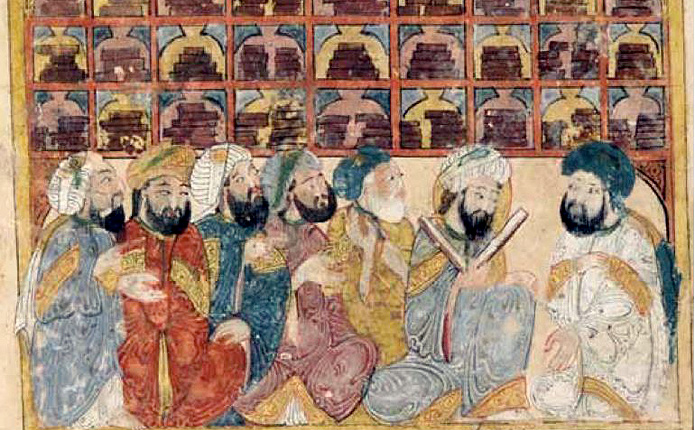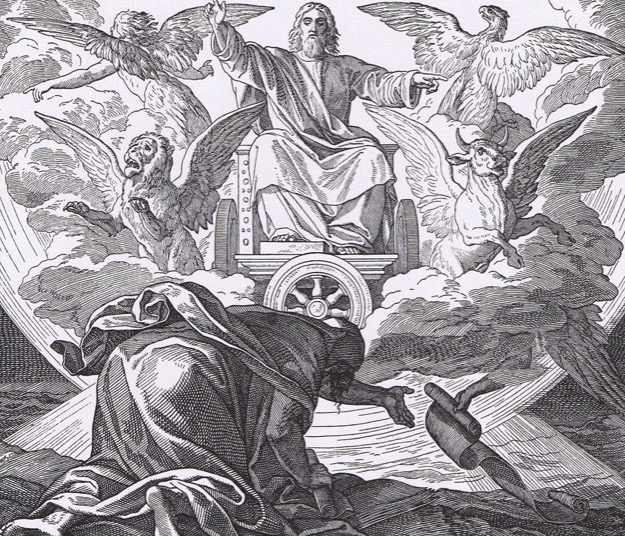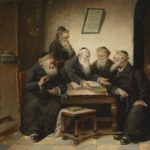So we have already discovered why Muhammad was seeking a spiritual encounter in a cave, we have learned how this encounter would be interpreted by a person of his time, and we know by what name the Power introduced himself. We also know why the Power claimed that humans start as a clot of blood. We’re going to deal now with the last three verses, all at once, so we understand exactly what the Power is offering to Muhammad , how it connects to what Muslims are offered as fundamental proofs of Quranic authority, and how it shapes what they believe about written (and unwritten) knowledge even now.
Let’s look at the first five ayat again:
- Call words! in the name of your Lord, He-Who-Created–
- He created man, from a blood-clot:
- Call words! And your Lord is the most generous,–
- He Who taught by (the use of) the pen,–
- Taught man that which he knew not.
There is one ayah introducing the Power in whose name the message is delivered, one in which the Power shows his legitimacy by vouchsafing secret knowledge to Muhammad, settling the Aristotle-Galen debate about embryology, and then three explaining that this was the Power that invented writing. Most of the first revelation is all about the Power boasting about inventing writing and claiming authority over it.
Who is the God who Invented Writing?
Again, in a Judeo-Christian framework, bringing technology to humans or instigating the adoption of technology that humans aren’t ready for is a classic action of a corrupt Power. The Creator God never claimed any such association.
In a pagan framework, gods frequently claimed association with various technologies, including writing. The Akkadian writing god was Nabu, which literally means “to announce, to prophesize” from the Semitic root N-B and still has cognates in Arabic and Hebrew. Nabiyy (نبي) means prophet in Arabic, and it is one of the two terms used to describe Muhammad (and the other is rasul, or messenger). Nabu was the inventor of writing, a divine scribe, and the god of oracles or prophesies. One of his symbols was a stylus resting on a tablet, and he inscribed the fates assigned to men by the gods on his tablet of fate. He was also a main messenger of the gods (through his writing ability and also his power over prophets).
Nabu himself was borrowed by the Assyrians and masculinized from the Sumerian goddess Nisaba. Nabu (cited as Nebo) is a god of Babylonians referenced in Isaiah 46:1, which probably mockingly cites the New Year celebrations in which Nabu’s idol was wheeled from Borsippa to the city of Babylon.
Nabu was associated with Thoth of the Egyptians, who was originally a moon deity before being credited with inventing the alphabet. Nabu and Thoth were both associated with the Greek god Hermes (Mercury), who received the same credit. Nabu was also associated with Mercury in Babylonian astrology, too, but he was also was associated with the oracle moon god of the Semitic Mesopotamians named Sin (from the Sumerian Nanna), who is mentioned in early Arabic sources as a god of the polytheist Arabs. Sin’s symbol was a crescent moon. Sin worship spread from the region of ancient Sumer across Canaan, where he was worshipped as the god of the (crescent) moon. Sin’s daughter was the Venus goddess Inanna/Ishtar/Astarte, who was called al-Uzza in Petra, and was the consort of Kutba or al-Aktab, the scribe and the god associated with Mercury.
I do want to be careful here to state that Allah is not and was not specifically or exclusively “the name of a moon-god.” The word Allah was a contraction of al-ilah, meaning generically “the god.” It could be applied to any important deity, just as El means simply “the god” in earlier Hebrew. El was applied by ancient Jews to Yahweh, and it was also applied to pagan deities by both Jews and pagans. Similarly, Allah was also already applied to Yahweh by Arabic-speaking Jews and Christians by the time Muhammad was born, and it was also applied to various pagan deities. If you were going to have a monotheistic One God in Arabic, Allah would be the name that you would choose, just as people chose the word God to refer to Yahweh in English. None of Muhammad’s contemporaries would assume that he must have meant a moon god if he said “Allah.” (A quick correction of an old mistake that gets repeated: the chief god Sayin of southern Arabia appears to be a sun/eagle god, not a moon god–reading S-Y-N as Sin was an early error of archeologists. That misunderstanding drove the chief god Imaqah of Yemen to also be misunderstood as a moon god instead of a sun/bull god–both the chief god and the chief goddess of pagan Yemen were sun gods! You can read more here, on this high-quality Islamic site.)
The name “Allah” as the name of the Power he encountered was almost certainly given to Muhammad by a heretical Christian, as we shall see. A monotheist (but not Christian or Jewish) “Allah” was already worshipped by a handful of people in Mecca when Muhammad had his vision, and “Allah” was probably additionally applied to a polytheistic god locally who was associated with several goddesses. Muhammad’s father would have been named after a polytheistic application of the name “Allah.” Again, this was a very generic word.
That said, it remains true that the god who taught men how to write could not be understood as the Creator by Jews or Christians, but it was a well-established trait of a number of pagan deities that were syncretized in certain reoccurring patterns.
Writing and Declaiming as Divination and Prophesy
The connection made between writing, prophesy, and fate is a very strong theme of the Quran, with roots in a time and a place where writing was seen to be almost a supernatural activity in and of itself–marks that could encode and then later be interpreted as knowledge would be practically magical to a largely pre-literate culture. This attitude persisted as a peculiarity of the time and place in which Muhammad lived. The neighbors of the Arabs were highly literate societies, arguably the most literate in the history of the world at that point, but Arabs themselves had very limited employment of writing.
There was an existing ancient Arabic script, but it was so little known that it when the Arab Nabataeans seized the site of Petra, which became the most powerful city controlled by the northern Arabs, the adopted the Aramaic script instead. The Nabataeans had even conducted all their official business in Aramaic, the lingua franca of the region, instead of their native language, because Arabic was hardly written at that point. The Nabataeans altered the alphabet with use and passed it on to other Arabs, where it displaced an older and barely attested alphabet and came to be used to write Arabic. At the time of Muhammad, then, Arabs were using a borrowed alphabet that was not attuned to their particular language, which had no literary history and no official governmental usage that would standardize it, all while retaining a semi-magical view of writing.
In addition, Arabs seem to have had a long history of regarding poetry as being able to harness or direct supernatural forces. Poetry was used for prophesy, for blessings, and for curses. In fact, a similar tradition of using poetry in this way is found in the Old Testament Bible/Tanakh, but the Arabs seem to have thought not just that poetry was an appropriate medium for expressing these things, but that poetry itself had otherworldly properties, like an incantation. (This ties to another pillar of Quranic authority, its incomparability as a literary masterpiece–something that again makes no sense to Jew, Christians, or moderns–even as Muhammad refuses to call it “poetry.”) Muhammad’s vendettas against various poets is understood by the pagan power that saw in their poetry.
When a magical poem is written down, it is then captured and fixed in place. This gives the written word an enormous power. In fact, it is recorded that poems used to be affixed to the Kaaba in Mecca in the Time of Ignorance as a part of a religious act. The written word contained the ability to manifest a poem through the voice many miles and even years away from its originator. If a poem had power when it was written down, just think of how much power the Arabs would see in an entire book!
The Quran: Holy Writing to the Illiterate
Until this point, the Arabs had produced no books of any sort. Everyone around them had books full of holy understanding, but they alone were left out. This would cause great feelings of inferiority among Arabs. Writing was sacred, but they did not even have a book to call their own. We can see from the sources that Muhammad thought that each people had its own, singular book. How could the Arabs get theirs when they were hardly literate?
But the Power claims authority over the written word. The Power has even claimed credit for inventing it! Because the Power has such authority, he has the ability to impart any divine knowledge, even that of the Book of Books, to Muhammad. In fact, the very fact that Muhammad could not initially read showed the authority of the Power, since a scholar who could read and write through non-supernatural means might be able to fake or approximate the greatness that is purported to be in the Quran, but an illiterate could be construed to be entirely dependent on the messenger to speak the words to him.
In addition, because this Power delivered the message through the spoken word from an immaterial original, the Quran acquired an even more mystical significance, as it was held to exist outside of human agency. Even if it was never written down, the Arabs will still have their book in their language–or so the idea went–if they would only memorize it. To a literate culture, this is a farcical substitute for writing. Writing is obviously easier and also more accurate. But to the non-literate Arabs, it was a special grace to have an unwritten book–they could claim something that was even better than writing, because not everyone can read, but practically everyone can speak.
This logic is the source of the extremely high priority placed on the word-for-word memorization of the Quran, as well as unsupportable claims about the purity, clarity, and superiority of the Arabic of the Quran. Memorization is even more important than understanding in traditional Islam–boys who do not know even a bit of classical Arabic will be made to memorize hours’ worth of sounds by rote and will be able to produce them as an act of piety and a ceremonial preservation of the supposedly eternal Arabic Quran. This emphasis also fostered a certain carelessness about the scribal tradition of the written Quran, because Muslims believed that the hearts of other Muslims were where the Quran could be best preserved for all of eternity. Of course, reality does not work this way, and there is almost a comically predictable cycle of crises whenever important people start realizing how far apart different versions of the Quran have grown, which predictably ends in a frantic effort of standardization and then an attempt (usually unsuccessful) at destroying all the variants.
The role of Arabic and the existence of a Quran that is co-eternal with Allah something very appealing to Arab pride. It is also completely contrary to Judeo-Christian beliefs–in fact, it must mean that the Quran actually is God, because the one defining and utterly unique characteristic of the Creator is his eternality.
See the main page on Surah 96:1-5 to continue.






